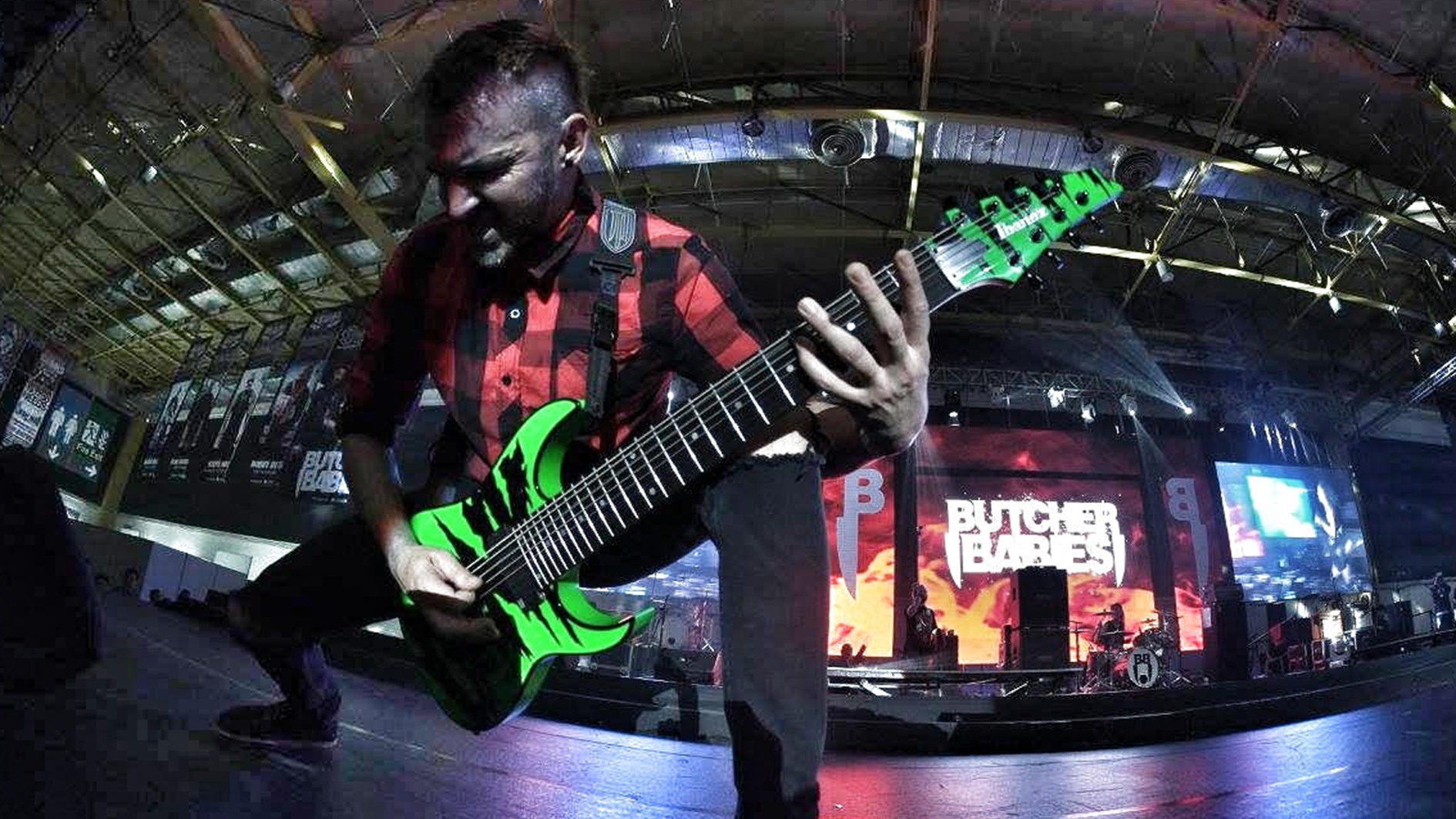Butcher Babies' Henry Flury: “I run all over the stage, so the last thing I want to do is dance on a pedalboard. I let my hands do the talking!”
The Ibanez endorsee on his love of eight-strings, adopting Meshuggah's tuning, and how the pandemic changed his mindset as a songwriter

25 years ago, Henry Flury left his home state of Oregon and moved to Los Angeles to pursue music full-time. At first, the decision was something of a disappointment to his parents, who hoped he would take over the family’s logging supply company. “But deep down, they understood,” he says. “They told me, ‘We knew you were going to do this, so go for it.’ I went to LA and never looked back.”
Flury, now based in Las Vegas, grew up in Roseburg, Oregon, a logging town and timber capital in the southern part of the state, and a two-hour commute to concert hubs like Eugene and Portland – treks that he made regularly.
At age 10, inspired primarily by Eddie Van Halen, but with a musical vocabulary that includes Alabama, Waylon Jennings, Pantera, Rammstein, and Prince, he began playing guitar.
Roseburg proved to be an invaluable starting point. The local music store, Southbound Sound, where Flury took lessons, built a strong foundation for its students by grouping them into bands.
“I immediately learned how to play with other musicians,” he says. “From day one, I had a drummer, and I started playing live music from the first time I picked up a guitar. That was so important because I learned how to play with other people.
“We played shows around town – at the mall, parades, high schools. We would do cover songs and it was really fun. I grew up with other musicians who ended up being really, really good, and that’s surprising for a small town with no music scene.
“This little store created a scene, and there were two rival bands: my band, Rockslide, and another band, Sticks and Stones. We competed around town, that really sparked me, and I never stopped playing. I had bands in high school, went to college for a bit, and then I decided I was going to LA to do this for real.”
All the latest guitar news, interviews, lessons, reviews, deals and more, direct to your inbox!
He arrived with job security, having secured a gig with a pop band called Neve, and later joined a hardcore punk group called Amen. Neither, however, achieved success during his tenure, and instead, in his words, there were “ten years of grinding in the LA scene and playing local clubs.
“To be noticed there was very difficult, and I was in bands that were scratching their way to the top. I had almost planned on giving up. I didn’t think I could keep doing it. And then Butcher Babies happened and it took off.”
With Butcher Babies, which is now founding members/vocalists Heidi Shepherd and Carla Harvey, drummer Chase Brickenden, and bassist Ricky Bonazza, Flury found a musical home that allows him to freely explore ideas and sounds.
Their 2013 debut album, Goliath, established them as a metal band, while recent singles Bottom Of A Bottle, Sleeping With The Enemy, and Yorktown, from an upcoming EP produced by Matt Good, indicate still more changes and experimentation.
“We decided to go with a producer who is not as metal to mix things up and do things that were out of our comfort zone,” says Flury.
We don’t have a target audience, and that has allowed us to implement various styles throughout our career
“We were no longer with a record label, the world had shut down because of the pandemic, and the idea of releasing singles and creating content around them made sense. It’s fun, our fans love it, and it keeps the fire burning.”
When you look at your decade with Butcher Babies, what are some of the milestones?
“Going into it, we knew we might be written off very quickly because people would look at us and think we were a novelty thing. But we also knew that Heidi and Carla are great frontwomen, capable of doing amazing stuff vocally, and that if we could get this band in front of people, they would take notice and change their minds.
“At that time we were a lot more theatrical, more horror-based, raw and punk-sounding. We were trying things, but very quickly audiences started showing up at clubs.
“Early on, we got some great tours – Manson, Mayhem – and people realized that we are a real band playing real songs and taking this very seriously.
“After Mayhem, things were never the same. We were everywhere and we got great opening slots. Our goal was to win people over and blow the doors off, no matter who we were playing with.
“And our audience has been surprisingly diverse. It’s everybody. We don’t have a target audience, and that has allowed us to implement various styles throughout our career. It’s been very flexible, and it’s fun to play and write for a band like that.”

How have you grown as a songwriter and guitarist?
“The pandemic changed our mindset because there is no live audience. Are we writing for people to mosh around at a festival, or are we writing for people who are listening at home and in their cars?
“It changed our way of writing. It became more melodic and dynamic. We’re incorporating more of a pop element and highlighting Heidi and Carla’s vocals, because there’s much more to this band than just ripping your face off. We wanted to showcase that, and this was the perfect time to do it.
“I write a lot of riffs. I have a riff catalog. I call them niblets, and I have this niblets folder. The niblets could be one riff or a whole idea, but whenever I'm writing, I keep the vocals in mind and how this will sound with what Heidi and Carla will do. They'll bring melodies and ideas, and we write riffs around that.
“Or we sit in the room, jam, and come up with ideas. We put ourselves in as many positions as possible to create. Sometimes ideas are really easy and sometimes it's like wrestling a bull – you'll spend days on an idea just trying to make it sound good.”
You’re an Ibanez artist. How long have you been endorsed?
“I played my first Butcher Babies show on a blue Telecaster, which made no sense at all! It belonged to the singer of my previous band. My other guitar was an Ibanez that I’d had since high school. Then we got an endorsement from Schecter and it was the coolest thing ever.
It is very difficult to make eight-strings sound good in the mix, and it has always been a challenge over the years trying to get it dialed in right
“My first eight-string was a Schecter. I love Meshuggah, and I wanted to learn some of their songs for fun. I brought the eight-string to practice one day and Heidi and Carla loved it, so it became my writing tool.
“I finally wrapped my head around it, and the tuning I use is the Meshuggah tuning: standard dropped a half-step with a low B flat and low F. I tuned it that way when I was learning their songs and never changed it. That’s the tuning on all our albums.
“I’ve been with Ibanez since 2013, and they have been awesome. I have my old eight-string model, the RG852, which was one of the first eight-strings that Ibanez made. It has EMG 89s in it. My green one, which is same model, next year, has DiMarzios, as does my newest guitar, the RG2228, which is a Prestige model.
“With my rig, I have a [Mesa/Boogie] Dual Rectifier that my dad got for me when I was in high school. It sounds amazing and I use it to this day. I’ve used it on every album. I was with Randall for a while, and switched to Kemper because we tour so much that I try to keep my rig simple.
“I’m not a big pedal guy. If you’ve ever seen us live, I run all over the place, and the last thing I want to do is dance on a pedalboard, so I have everything programmed. I leave it alone and just play – let my hands do the talking and just go for it.
“Also, I want it to be as easy as possible for our front of house. It is very difficult to make eight-strings sound good in the mix, and it has always been a challenge over the years trying to get it dialed in right.
“We have two singers, bass, guitar, and drums, and so the guitars have to be very, very big, but not over-dominating, and they have to be clear. The tone has to be just right, so I spend time with our sound guys, making sure that it sounds explosive and huge. The eight-string has been a great tool to fill out the spectrum with this band.”
May is Mental Health Awareness Month, so in closing, you have spoken openly about suffering from anxiety and debilitating panic attacks. Why is it important to you to discuss this publicly, and what do you wish people understood about these conditions?
“I talk about it because you wouldn't think that I would be able to do what I do, having that problem. When you have anxiety and panic attacks, if you don't get a handle on it, your world gets smaller and smaller.
“It started to affect my ability to perform. I was in shambles before going onstage. I knew at some point that I’m either going to beat this or I'm going to die. I made a decision that I needed to get a handle on it, and I was able to.
“You can defeat these things. It's not impossible to get through. If anybody is having that problem, there are resources and you can get help. The more I talk about it, the more I find how common it is.
“When you don't talk about it, you feel like you're the only one with that problem, but it’s so many people, and I want to help as much as possible.
You can defeat these things. It's not impossible to get through. If anybody is having that problem, there are resources and you can get help
“I had my first panic attack in seventh grade. I battled it for years and it was debilitating. I could never overcome it. It makes no sense to people who don't have them, so you don't want to talk about it because it sounds ridiculous.
“It started to affect things I really cared about – going out, playing onstage, being with friends or family, because the more you experience panic, the more you apply it to everything around you.
“The day I decided that I needed to get help, I was getting a haircut. I was sitting there and having an absolute meltdown.
“I got in my car and I was like, ‘I can't do this anymore. I have to get help.’ I called my parents and said, ’Please help me.’ So it took a long time. It’s not that I don’t have anxiety anymore or get panicky once in a while, but now I know how to keep it from getting out of control.”
Alison Richter is a seasoned journalist who interviews musicians, producers, engineers, and other industry professionals, and covers mental health issues for GuitarWorld.com. Writing credits include a wide range of publications, including GuitarWorld.com, MusicRadar.com, Bass Player, TNAG Connoisseur, Reverb, Music Industry News, Acoustic, Drummer, Guitar.com, Gearphoria, She Shreds, Guitar Girl, and Collectible Guitar.
